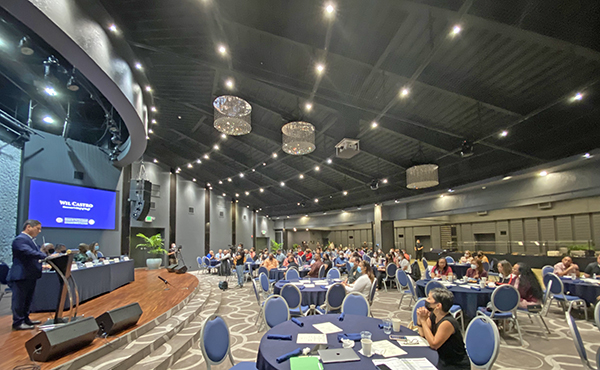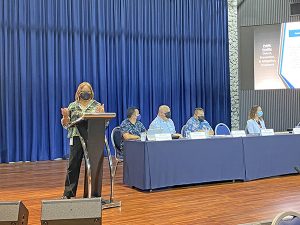CNMI UPDATES TRAVEL PROTOCOLS
5th day testing now optional for vaccinated travelers

Will Castro, Gov. Ralph DLG Torres’ chief of staff, introduces the set of panelists for the COVID-19 protocol forum last Friday at the Kensington Hotel Saipan. (Kimberly B. Esmores)
The CNMI continues to evolve and adapt to the “new normal” under the COVID-19 pandemic, this time updating its travel protocols to make fifth day testing optional for fully vaccinated travelers.
During a COVID-19 protocol forum last Friday at the Kensington Hotel Saipan, Commonwealth Healthcare Corp. CEO Esther Muña informed government and private sectors of the new COVID-19 protocols in place in light of the recent surge of omicron cases in the CNMI.
Aside from scrapping on-arrival COVID-19 testing altogether, Muña said fifth day testing has now been made optional for vaccinated travelers.
“As this pandemic shifts, our strategies will also shift. We’re no longer requiring testing on arrival. For vaccinated travelers, they must fill out a health declaration form but now, fifth day testing is optional,” she said.
Muña said that both vaccinated and unvaccinated travelers must still fill out a health declaration form before entering the CNMI but, unlike vaccinated travelers, unvaccinated individuals will be given a registration code for fifth day testing.
“All travelers must fill out a health declaration form before they enter the CNMI. But unvaccinated travelers must test after five days. Once they register to fill out a declaration form, they will be given a code that registers them for fifth day testing,” she said.
Lastly, vaccinated essential workers will no longer be quarantined but unvaccinated workers must fill out a quarantine application form before entering the CNMI.

Commonwealth Healthcare Corp. CEO Esther Muna announces the CNMI’s new entry protocols during a COVID-19 protocol forum last Friday at the Kensington Hotel Saipan. Behind her are the other panelists: From left to right, Patrick Guerrero, Warren Villagomez, Gov. Ralph DLG Torres, and Dr. Lily Muldoon. (Kimberly B. Esmores)
“There is now an essential worker application form for quarantine but this only applies to unvaccinated workers. Vaccinated individuals do not need to quarantine. Once they enter, they are free to leave and go to work,” she said.
According to Dr. Lily Muldoon, medical director of public health and CHCC emergency physician, the shift in protocols is to focus on medically significant community infections instead of border surveillance.
Muldoon said that, although focusing on blocking COVID-19 at the border worked in the beginning, considering that the CNMI now has a vaccination rate of 99% and the omicron variant is notorious for being more contagious than both the alpha and delta variants, the CNMI must now shift to focusing on treating severe cases and containment within the community.
“Omicron data suggests that omicron is less severe but it can still cause hospitalization. Because it is more contagious, if the spread is not contained, the CNMI risks overwhelming its healthcare system. We want to protect and not overwhelm our healthcare system,” she said.
To date, there are five individuals hospitalized as a result of COVID-19.
For those experiencing severe symptoms of COVID-19, Muña and Muldoon encouraged them to visit the COVID-19 treatment sites located next to the Koblerville basketball court, or the MCATS tent located at CHCC.
Friday’s event was attended by Gov. Ralph DLG Torres, tourism and hotel industry stakeholders, several health officials, lawmakers, and municipal leaders, among others.























